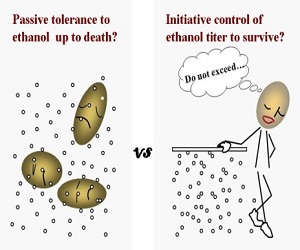
Weilan shao
Jiangsu University, China
Title: Why is the thermophilic ethanol fermentation limited to low ethanol titers?
Biography
Biography: Weilan shao
Abstract
Ethanogenic thermophiles can conduct consolidate fermentation of cellulosic ethanol; however, their practical application has been hindered by the fact that the fermentation results in relatively low final ethanol titers. Metabolic engineering has emerged as a powerful tool for improving ethanol production, but it is very fundamental to understand why thermophilic ethanol fermentation is ended, and how ethanol productivity can be elevated via metabolic engineering. Thermoanaerobacter ethanolicus strains are able to grow at temperatures above 70oC, use xylose efficiently, and produce ethanol as main fermentation product. Therefore T. ethanolicus JW200 is taken as a model strain of thermophilic ethanogens to study ethanol fermentation pathway and its regulation mechanisms. After AdhE was identified as the main aldehyde dehydrogenase (Aldh) ,physiological roles of the key enzymes AdhA, AdhB and AdhE have been determined in T. ethanolicus. All the seenzymes are able to catalyze reversible reactions forethanol formation and consumption based on substrate concentrations. AdhB gene is transcribed at beginning of cell growth in the absence of ethanol; AdhB has weak but both Aldh and Adh activities which initiate ethanol formation. The trace ethanol produced by AdhB induces gene transcription to produce AdhA and AdhE which conduct active
formation of ethanol. Further accumulated ethanol will increase the reverse reactions for ethanol consumption and inhibit the transcription of all Aldh and Adh genes. The transcription of dehydrogenase genes is regulated by redox-sensing-protein, which binds to oprators of different affinities so that adhA, adhB and adhE are expressed at directed time. Traditionally, it is believed that low ethanol titer is resulted from lacking high ethanol tolerance in thermophilic ethanogens (>4%). However, presented results support a regulation theory: The limitation of final ethanol titer is achieved in thermophilic ethanogens by a systematic regulation through transcriptions and reversible activities of the key enzymes involved in the ethanol fermentation pathway.


